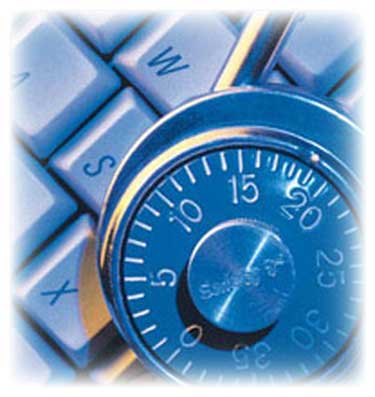Business Buzz

How safe is your computer?
by Carole Worley and John P. Gardner, Jr.
If you think your computer at work or at home is safe, think again. The more connected the world becomes, the more careful we must become. The business community must become ever more vigilant as the dangers it faces multiply, it seems, at an exponential rate.
Hen businesses began using e-mail about ten years ago, we did not know that the word "virus" applied to machines as well as people., a few years ago, we woke up and realized that you simply do not access the World Wide Web without virus protection. Times change. Today, what you need to do to avoid a catastrophic loss is mind-boggling.
Just six months ago, a leading technical journal printed that one could be reasonably safe in the use of one’s computer if one simply had a hardware firewall, a software firewall, anti-virus software, anti-spam software and anti-Spyware software. Nothing about that combination sounds simple to me – especially when I read the need for daily software updates along with constant security updates for your operating system!
Another slight problem – the short list above was expanded in a Consumer Reports article suggesting there were 28 separate steps needed to protect your self from the ever-growing list of threats. Now, I read that the list of steps for being reasonably safe has expanded again so it includes -- but, I caution, is not limited to -- the installation of a "security suite" of programs.
The challenge arises in the multiple points of entry through which criminals can access your most private data – and not just your data, but also your employees’ information and your customers’ confidential data. Add to that the new federal law, commonly known as FACTA, going into effect June 1, 2005, that makes an employer or business owner liable if the information is stolen from them or you. Than you begin to understand that the theft of data is a significant threat to the viability of your business.
At a minimum, every business owner must protect his or her e-mail from spam, viruses and Spyware. You must make sure that, if you have a network, it is secured, as well. Then you must secure the doorways into and out of your network. This is commonly called the network perimeter, which begins with your Internet service provider’s router to ward off worms, Trojan Horse programs and other malignant, or even benign, material. Then, you need to scan Web content so you don’t simply click on a Web page and download a serious security threat. Web filtering software must be employed hee in comination with other perimeter solutions. And wireless networks present their own potentially gaping hole in your protection. The let’s not forget laptops and the unique challenges they present.
There simply isn’t room here to answer all the questions raised. For additional information about computer security, identity theft products, all three forms of identity theft and the new federal law FACTA, call Carole Worley at 638-4369 or log on to www.prepaidlegal.com/hub/crworley.
Carole Worley is an independent associate with Pre-Paid Legal Services, Inc., a 32-year-old company, publicly traded on the NYSE, specializing in identity theft and legal services nationwide.
John P. Gardner, Jr., is a third-generation attorney in South Carolina with 25 years' practice as a criminal attorney, eight years' experience in the S. C. General Assembly and four years service as a state highway commissioner. He also co-authored Chicken Soup for the Entrepreneurial Soul.
Page created and maintained by West Florida Electric Cooperative, Inc. © 2001.
designed by embryo design